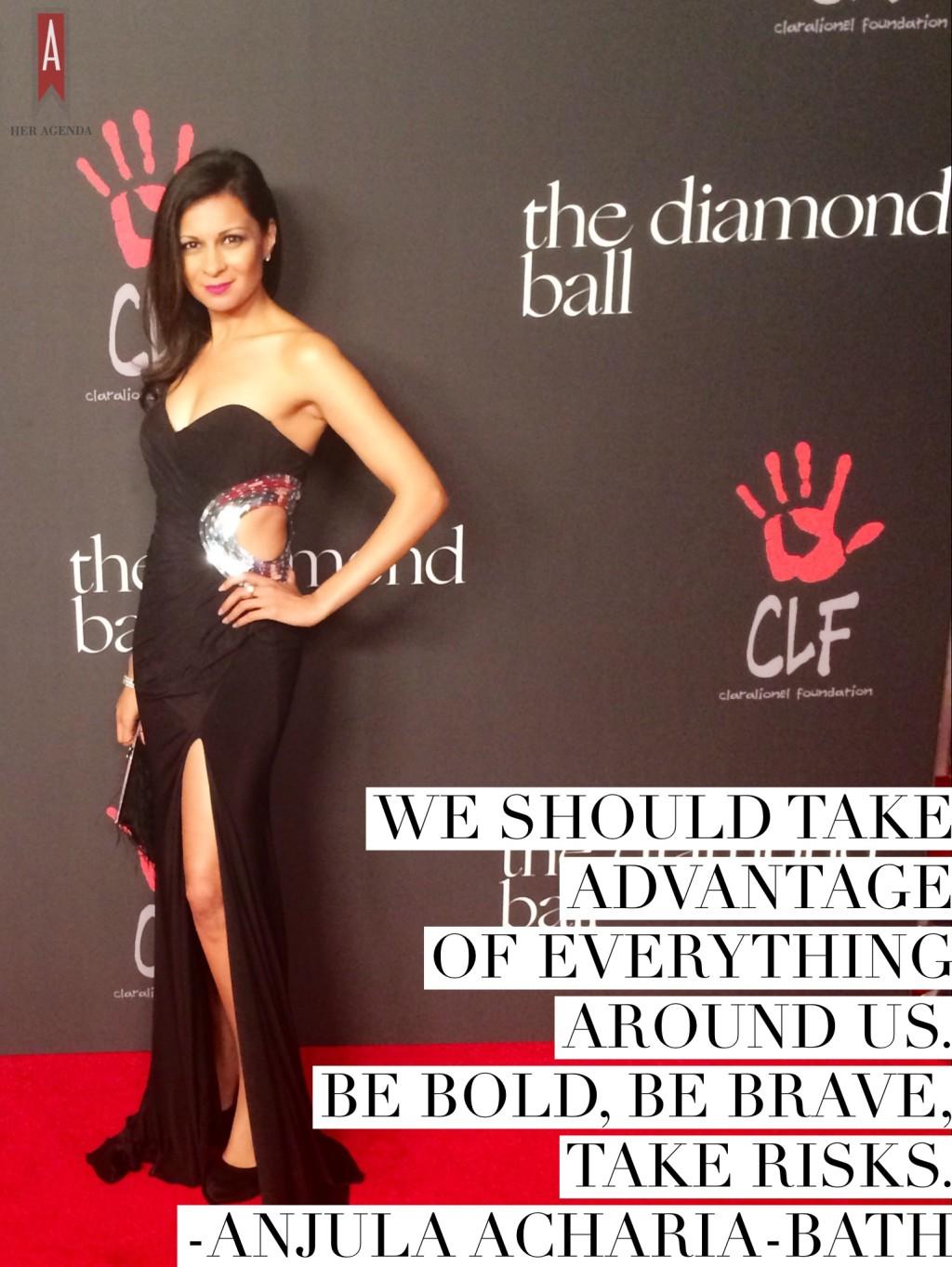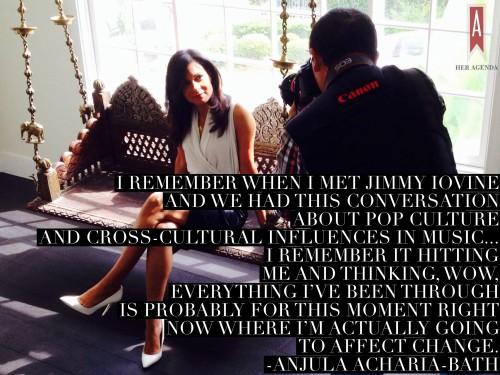From the moment I got on the phone with Anjula Acharia-Bath, she was never at a loss for words.
I was a little shocked. People, in general, respond differently to phone calls with people they, just, don’t know. But Anjula spoke so easily about the inner workings of her life from beginning to end.
However, Mrs. Acharia-Bath has nothing to hide and everything to show. She’s ready to tell her story because she knows it. So, why be quiet?
Anjula is using music and tech as her tools to create a more diverse and inclusive culture; pop-culture to be exact.
I remember listening to “Beware of the Boys” by Punjabi MC ft. JAY Z, a merge of Bhangra music and one of South Asia’s biggest music artists with Hip Hop and it’s king. I remember the rhythmic beat that brought me into a world that wasn’t fully mine, and I loved it.
This is the type of collaboration Anjula lives for, and works to make happen today. As CEO of Desi Hits, she helps Hollywood’s biggest stars and brands to connect with South Asia culture in a meaningful way. She bridges gaps between tech and music. Today, she’s worked with the likes of Lady Gaga, Britney Spears, Katy Perry and Priyanka Chopra and brands including Guess? and Beats by Dre. Her work, and she, has been featured in The New York Times, Billboard, Forbes, BusinessWeek and Forbes to name a few. 10 years ago Mrs. Acharia-Bath never thought she’d be making an impact in this way, but here she is.

Upbringing
Growing up, Anjula was a brown girl living in a stark white suburban world, a neighborhood right outside of London. Her neighbors and “friends” called her “Paki”, a derogatory term used to widely describe every other similar looking person living in the UK, but from South Asian. Yet Anjula’s parents were from India, she was Indian.
“It was a distressing time. Not that I didn’t have good times during my childhood, but, overall, it was really tough. I can tell you that most of my school life, I didn’t enjoy because it was horrible. It made me feel totally inadequate. Kids wouldn’t interact with me. We used to do this thing called country dancing at school, and the kids wouldn’t hold my hand. The boys wouldn’t hold my hand because they would say that the color would come off. They would hold my sleeve [instead]. Everyone would be laughing about it, and I would laugh with them because I didn’t know what else to do. The teacher would laugh with them. It was acceptable.”
She was able to turn a life that could have destroyed her, into something powerful and deeply positive. The bleak lack of diversity in her childhood, and her life, has become a progression towards something completely opposite, something vibrant. Now, she creates rifts in pop culture. She works to create a diverse lens where “unlikely” musical unions exist and take off.
That is exactly how she views the world: with a lens.
And that’s probably how, even through the turmoil she experienced, she was able to pin point a unique moment that would help to shed the ugly image she’d been fed of herself. It was a pivotal moment that she remembers as part of the process of coming into her own and setting the tone for the rest of her life and career.
The setting was a club in London where the DJ (soon to become her husband) was mixing Hip Hop and Bhangra, a popular trend at the time. She watched her friends, from Indian to West Indian to English, and others in the crowd, dance to the rhythmic mix of two different worlds.
“I remember just standing there,” Anjula told me, “dancing, just going, ‘Oh my God. Here I am. This is me. This is who I am. This is representative of my experience.’”
Not the music, per say, but what we would call nowadays, the #mood. The intermix of culture, music, people, attitudes; it just worked. All of these people existed in the same space, and so did their livelihood. It seemed to enhance everything around her. Yet, even then, who would have known she’d find herself in the music world the way she is now? Not her.
“I don’t think I ever thought it was going to be part of my career. I remember when I met Jimmy Iovine and we had this conversation about pop culture and cross-cultural influences in music…I remember it hitting me and thinking, ‘Wow. Everything I’ve been through is probably for this moment right now where I’m actually going to affect change.’”
Not too long after Anjula met entrepreneur, music producer and film producer Jimmy Iovine in 2009, she found herself at lunch with Iovine and JAY Z, talking about “Beware of the Boys” by Panjabi, remixing featuring Jay, and it’s relevance across the world.
“My focus was taking Indian music to the middle of America in a positive way, in a way that was cool and fun.”
Founded in 2007 along with her husband Ranj Bath, her company Desi Hits began as a successful music podcast. Since then, it’s evolved into its focus as an agency using pop-culture to mold a more inclusive-culture, by connecting Hollywood big wigs and brands to stars in South Asian culture. To date, they’ve worked with major stars like Lady Gaga and big brands like Beats by Dre.
We should rewind, because I think the question we all want to know, is how Anjula found herself in this place, and what did her life look like, career-wise?
From 1997-2000, Bath worked at TMP Worldwide, advising their digital offering. Namely, Monster.com.
“I started working with a lot of start-ups and working with the technology space, and meeting with people in tech. I founded a bunch of divisions within a huge company. So, I’m a bit of an entrepreneur because anytime they built a new division they would come to me. Then I left and I started my own company. “
She eventually sold that company. Her time at TMP, in many ways, was the beginning of her deep interest and involvement in tech.
This is a reminder, Anjula is a mover and shaker. She specializes in bridging gaps. So connecting people and ideas is what she does best, and is known for. Today, in addition to Desi Hits, she is an angel investor for consumer tech start ups is, on the advisory board of ClassPass, TheHunt and TheMuse.com, and manages international world star Priyanka Chopra.

Day to Day
So how does someone juggling so many moving parts, in such crucial positions of power?
“My days are totally crazy and different, depending on what’s happening.”
That’s normal for someone of Anjula’s stature. The way she does it serves as a good strategy for getting things done while also navigating her passions.
“My life is…really multifaceted. I try to get everything to cohesively work together. I try to get my worlds to collide in a really positive way so I can be more effective.”
So, her days vary. One day she could be out with Priyanka Chopra. Philanthropic work plays a huge part in the work she does with Chopra.
A large chunk of her time, she spends with start-ups. Coaching, giving advice and “just trying to help a gal out” as she put it.

Advice to millennials
“There’s so much access to everything, you really can do anything, I really believe that. Not to look at the reasons you can’t, but look at all of the reasons why you can.”
This is clear advice, but we all don’t have the economic, social, and sometimes political, privileges that give others a one-up to navigating their passions more seamlessly than others.
Still, my conversation with Anjula had a common thread relating to all young people and achieving goals.
“You have the knowledge and choices I don’t think at our age, we had,” she explained. “You used to need a certain amount of experience and lots of prerequisites and years behind you. Now, the same rules and regulations don’t exist.”
It’s why Ms. Acharia-Bath takes risks on herself, and others.
“The thing about the world today, is you never know who somebody is going to be tomorrow.”
“Based on that, you never know who you’re going to be tomorrow. Am I willing to talk to somebody? Am I willing to pitch my idea? Am I willing to be bold? Yeah! Because I don’t know who I’m going to be tomorrow, they don’t know who I’m going to be tomorrow. The world is so amazing now.”








